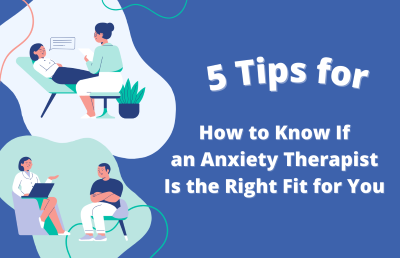5 Tips for How to Know If an Anxiety Therapist Is the Right Fit for You
5 Tips for How to Know If an Anxiety Therapist Is the Right Fit for You

If you have decided to seek treatment for your anxiety or OCD, first off, bravo! You are making a courageous and healthy choice for yourself and because therapy does work, you have a great reason for optimism that your life can get better. But choosing a therapist can be an overwhelming decision: there are so many therapists out there, how can you be sure you are choosing someone who is the right fit for you?
I hope this article will give you some guidance in making that choice a little easier. Here are some tips for how to know if an anxiety therapist is the right fit for you:
1. Can they give a clear explanation of your problem that resonates for you?
Your therapist should be able to hear about your problem and give you a clear explanation for why they believe you have this problem and what is maintaining it. With anxiety, this usually means explaining the basics of how anxiety works and how that process shows up in your unique situation. The key idea here is that you should hear this explanation and feel like it makes sense for YOUR life. It has to resonate for you. If it doesn't, then you and the therapist are not going to be on the same page and therapy is less likely to work.
If you are seeking a therapist in private practice, most therapists do a free consultation before you meet with them, which is a cost-free way of hearing how well the therapist can explain basic anxiety concepts, albeit briefly. In other settings, this may not be possible and you may not be able to assess this until you have your first session with the therapist. But any good therapist should be able to give at least a brief explanation of your problem pretty early on in the process.
2. Do they explain their treatment plan for your therapy?
By the end of the first session, your therapist should give at least a brief explanation of what their plan is for your treatment. This may sound obvious, but I can't tell you how often I hear from clients that their previous therapists never did this at all, let alone in the first session.
Bear in mind that the plan will get more detailed and accurate as they get to know you better over the course of more sessions; all I mean here is that you should get some explanation of what therapy is going to look like pretty early on. This may sound obvious too, but if the therapist doesn't do this, then they may not have an actual plan for you! If they don't volunteer a plan, you should ask directly what their plan is.
I give this tip because I think it is very common for people to meet a new therapist and feel like they are nice and caring and come back for more sessions simply because they were nice. I encourage you to demand more...there should be a plan for your care, and it should be conveyed to you directly and clearly.
3. Does their rationale for their treatment plan make sense to you?
Not only should your therapist tell you what their plan is, they should also be able to justify why they have chosen this plan. And again, their explanation may resonate for other people, but what is important is that it makes sense to YOU. There is even research that suggests that therapy is more effective when the client understands and agrees with the rationale for the treatment plan, regardless of what treatment is actually used.
Now bear in mind, especially with anxiety treatment, that doesn't mean the treatment plan needs to sound fun or appealing. Good anxiety treatment typically involves doing exactly what you least want to do because the most effective treatment for anxiety (exposure therapy) is all about facing your fears and allowing some short-term anxiety in the service of long-term relief. I would say that the treatment plan presented to you and its rationale should make sense but should also sound challenging. I often tell my clients that because of the nature of how anxiety works and how therapy for it works, if they did not express some hesitancy about what I am suggesting, I would worry that I am actually not on the right track.
4. Do you feel allied with them as collaborators on your treatment?
Research suggests that one of the most important factors that influence the outcome of therapy is the strength of the collaborative alliance between therapist and client. Early on in therapy, my advice here is honestly just to go with your gut feeling. After spending a session or two with your therapist, do you feel like they genuinely care about you getting better? Do you both agree on your treatment goals? Are they responsive to your feedback and questions? And, to put it in the least scientific way possible: how are the vibes? In other words, do you feel like you jive with the therapist and can feel comfortable being open with them (bearing in mind that some anxiety about disclosing very personal topics is to be expected)?
5. Are they specialized in anxiety?
If anxiety is the primary thing you need help with, I strongly advise that you see a therapist who spends most or all of their time treating clients with anxiety. The types of things that work best in therapy for anxiety are a little different from typical treatment for some other problems and you are going to maximize your odds of success by seeing a specialist.
When you go to therapy for any problem, what you want is for the therapist's reaction to be "Great, I've seen this a million times, I know exactly what to do for this, here's what we'll do." With anxiety, you are of course more likely to have that experience with a specialist.
A specialist is also more likely to be well-versed in current evidence-based treatments for anxiety, such as exposure therapy, cognitive behavioral therapy (CBT), Acceptance and Commitment Therapy, and mindfulness.
I hope these tips are helpful in guiding you towards a therapy that works for you!
Comment below on whether you've had experiences before in therapy where you felt like the therapist was a great fit. Or have you had experiences where the therapist felt like not such a great fit? What made you feel that way?



















